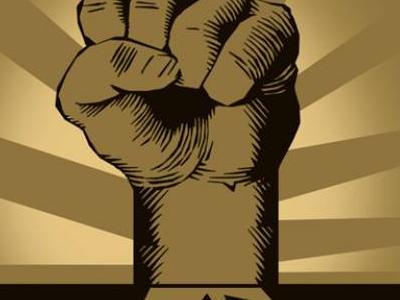People’s Conspiracy: Writing off the Arabs

(Image Credit: Dana A.Shams/©Gulf News)
By Ramzy Baroud, Special to Gulf News
Professor Robert B. was my first Middle East politics lecturer at the University of Washington. Only minutes into his opening lecture, he made a comment that had me sink into my seat with embarrassment: “The Arab world is made of strong leaders and weak people.”
While I didn’t feel able to protest openly in that moment, I knew that my professor was wrong. Oppressed people may sometimes give the impression of weakness, but they always reclaim their place in history whenever the oppression reaches unbearable levels.
The compartmentalised understanding of the Arab world in US academia has both influenced, as well as been influenced by US foreign policy, which insists on dividing the world into blocs. Here, nations become pawns in a Great Game: ‘weak people’ to be ignored or manipulated and ‘strong leaders’ to be fought, bought or contained. The tools in the game are hard power (tanks and guided missiles) and soft power (diplomacy and economic arm-twisting).
Such division is essential in official Western thinking. It allows the academic to provide clear-cut answers to complex realities. It also allows government officials to determine swift positions while responding to developing crises. The rationale is not motivated by ethics and responsibility, but rather by self-interest and materialism.
The US is not the only country that relates to the world in this way. The French government took a stance against the popular Tunisian revolution, exemplified in the suggestion made to the parliament by then Foreign Minister, Michele Alliot-Marie. “France should consider sending anti-riot police to train Tunisian security forces in how to put down the uprising,” she said, according to the Washington Post (February 27). Alliot-Marie’s response was largely consistent with her country’s foreign policy agenda, which sided with ‘strong leaders’ fighting ‘common enemies’ in exchange for economic and political perks.
New Era
“It is a new era,” declared President Nicolas Sarkozy in a televised speech on the day of the government reshuffle. Indeed, it was, for the people were proving themselves to be far less weak than my political science professor once imagined. Naturally, France rearranged its policies, but only according to the same conventional wisdom. It casted long-time ally, the now-exiled Tunisian president, Zine Al Abidine Bin Ali, as an enemy. It celebrated Tunisian youth as the harbingers of democracy. It also took the lead in the fight against another strong ally, Libya’s Muammar Gaddafi, to ensure a place for itself in the changing geopolitical reality of the Middle East.
The US too was caught by surprise, and quickly tried to learn from its mistakes. Its stance on the ‘Arab Spring’ seemed confused in the case of Egypt, which had long stood as the model for an Arab country with a ‘strong leader’ and ‘weak people’. Now the US position was erratically revised. Up until a few days before President Hosni Mubarak’s resignation on February 11, US foreign policy experts could not truly assess the power of the Egyptian people, nor appreciate the weakness of their once strong and reliable ally.
It was a failure across the board. The media fumbled as its experts warned of imaginary threats. Politicians spread contradictory messages. President Barack Obama seemed to have a different understanding of the situation than his vice-President Joe Biden. Up until late January, Biden had been against Mubarak stepping down. He described the revolution in Egypt as an expression of “middle-class folks [looking for] a little more access and a little more opportunity,” according to the Fox News website, January 28. Expectedly, academia had little to offer in this case.
Although Arab uprisings awakened a sense of pride and collective power of people across the Arab world, they failed to ignite the imagination of these three institutions. While Western governments designated themselves as the guardians of the Libyan uprising, turning a peaceful call for change into an all-out lethal war, the media looked for answers to the obvious question: why did the Arabs revolt? They spoke of the effect of social media and credited minuscule Western financial aid as the reason behind the mass uprisings. But few truly appreciated the extent of the oppression meted out against revolting Arabs, and the relationship between the falling dictators and their Western benefactors. Worse, many commentators neglected to mention that people power, while difficult to qualify in political science laboratories, is a real force, capable of altering any status quo and challenging any conventional wisdom.
Even commentators from the Left — although generally kinder and more truthful in their understanding of the Arab uprisings — fell into the same elitist trap. They laboured to explain how Western imperialism was the hidden hand guiding the apparently gullible Arabs. While US meddling and co-opting of political forces has never been a secret, such overriding conclusions expect us to believe that 15 million Egyptians from all walks of life protested on one single day because individuals affiliated with the April 6 Youth Movement in Egypt allegedly received some money or training in the US.
For a long time, Western foreign policy, political scholarship and news reporting failed to recognise a major player in the West’s Great Game in the Middle East. This player is collectively known as ‘the people’.
The people may give an impression of weakness at times, but when they are united and organised their power is impossible to dispute.
It has been nearly 20 years since my first political science class at the University of Washington. I have finally made my point.
– Ramzy Baroud is an internationally-syndicated columnist and the editor of PalestineChronicle.com. His latest book is My Father Was a Freedom Fighter: Gaza’s Untold Story (Pluto Press, London).










































0 Comments